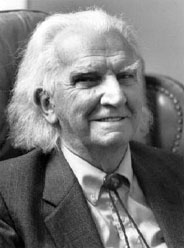The International Society for Ecological Economics
Kenneth E. Boulding Memorial Award for Ecological Economics
 Kenneth E. Boulding (1910-1993) was a leading systems thinker who integrated social theory with the natural sciences and moral philosophy. He was an eccentric, provocative critic of the fragmentation that characterized modern scholarship. Yet his creativity, seminal ideas, and constructive engagement with the scientific community were widely recognized, resulting in his being elected President of the American Economics Association and the American Association for the Advancement of Science. Kenneth and his wife, Elise Boulding, herself a renowned sociologist, were Quakers who actively contributed to the international peace movement. Kenneth lived humbly, with grace, wit, and laughter, and maintained unbounded faith that goodness and sensibility would ultimately prevail in a world that was seriously threatened by human folly.
Kenneth E. Boulding (1910-1993) was a leading systems thinker who integrated social theory with the natural sciences and moral philosophy. He was an eccentric, provocative critic of the fragmentation that characterized modern scholarship. Yet his creativity, seminal ideas, and constructive engagement with the scientific community were widely recognized, resulting in his being elected President of the American Economics Association and the American Association for the Advancement of Science. Kenneth and his wife, Elise Boulding, herself a renowned sociologist, were Quakers who actively contributed to the international peace movement. Kenneth lived humbly, with grace, wit, and laughter, and maintained unbounded faith that goodness and sensibility would ultimately prevail in a world that was seriously threatened by human folly.
This award honors people who exemplify aspects of Kenneth E. Boulding’s special character. It hopes to perpetuate his many individual strengths, combined into wisdom, among ISEE members and beyond.
2027 Boulding Award Nominations
Nominations for the 2027 Boulding Award are open until December 15, 2026. You can submit nominations by emailing a CV of the nominee(s) and justification for nomination to secretariat@isececo.org.
2025 Boulding Award for Ecological Economics Recipients

The International Society for Ecological Economics has jointly awarded Jerome R. Ravetz and Silvio Funtowicz the 2025 Kenneth Boulding Award.
Jerry (Jerome) Ravetz
Jerry (Jerome) Ravetz came to England as a Fulbright Scholar from the USA and did a PhD in mathematics at Trinity College, Cambridge. He was Reader in the History and Philosophy of Science at the University of Leeds before retiring to found The Research Methods Consultancy. He wrote the seminal book Scientific Knowledge and its Social Problems (1971, 1996)*. There he introduced the concept of ‘industrialised science’, and explored the issue of the preservation of quality in the new, depersonalized research society. He studied scientific uncertainty and its management, co-authoring (with Silvio Funtowicz) Uncertainty and Quality in Science for Policy (1991). There they developed the NUSAP notational system, whereby the qualitative aspects of quantitative information could be expressed through a notational system for characterising uncertainty and quality in quantitative expressions. Then they developed the theory of ‘Post-Normal Science’, (PNS) which applies when facts are uncertain, values in dispute, stakes high and decisions urgent. His other books include The Merger of Knowledge and Power (1991), a collection of essays, and A No-Nonsense Guide to Science (2006).
Jerry’s current work is in the borderland between research and search. He is grappling with issues of growth and decay in science, in the context of the erosion of inherited certainties and of societal transformation. In an age of decline and demise of major social institutions of all sorts (European empires, Soviet Union, Catholic Church, gender-binary structures of governance and oppression), what is happening to Knowledge? Are we entering a period of creative instability like the Protestant Reformation? Has our technology-based material culture lost resilience against the coming shocks? Such questions have no easy answers, if indeed any at all; the perspective of Post-Normal Science at least opens the way to their exploration. Since mathematics has become the icon (perhaps idol) of truth in the post-theological age, critiquing its supposed certainties could be a key to unraveling the contradictions underlying our present perplexities.
Silvio O. Funtowicz
Silvio O. Funtowicz is a philosopher of science who is active in science and technology studies. He began his career teaching mathematics, logic, and research methodology in Buenos Aires, Argentina. He left Argentina during the military dictatorship and moved to England where, during the 1980s, he was a Research Fellow at the University of Leeds, where he started his cooperation with Jerry Ravetz. Until his retirement in 2011, he was a scientific officer at the Joint Research Centre of the European Commission (EC-JRC). In 2012, he became a professor at the Centre for the Study of the Sciences and the Humanities (SVT) at the University of Bergen, Norway, and since 2021, he has been a guest researcher there.
Silvio’s co-authored book with Jerry, Uncertainty and Quality in Science for Policy[2], started a series of reflections on the quality of science used for policy, mostly concerning environmental and technological risks and policy-related research. The article ‘Science for the post-normal age’ is the most cited paper in Futures. Another paper of note is ‘The worth of a songbird: ecological economics as a post-normal science’ in Ecological Economics. Today, PNS is intended as applicable to most instances where the use of evidence is contested due to different norms and values. For Carrozza PNS can be “framed in terms of a call for the ‘democratization of expertise’”, and as a “reaction against long-term trends of ‘scientization’ of politics—the tendency towards assigning to experts a critical role in policymaking while marginalizing laypeople”.
2025 Boulding Award Committee
- Peter May, Chair Full Professor at the Federal Rural University of Rio de Janeiro-UFRRJ (retired)
- Marco Vianna Franco, Professor of history and philosophy of ecological economics, Goldsmiths, University of London, UK
- Lisi Krall, Professor of Economics at the State University of New York, Cortland, USA
- Jane Mariara, Executive Director (ED) of the Partnership for Economic Policy (PEP), Kenya
- Volker Mauerhofer, Professor, Mid Sweden University, Department for Natural Science, Design and Sustainable Development, Sweden
- Rajeswari Raina, Professor Shiv Nadar University, Delhi, India
The Awardees will be honored at the ISEE Conference in Oslo in June 2025.
2023 Boulding Award for Ecological Economics Recipients
The 2023 Boulding Award Jury Committee is delighted to announce the joint recipients of the 2023 Award: Bina Agarwal, Professor of Development Economics and Environment at the University of Manchester, and David Barkin, a professor at the Metropolitan University in Mexico City.


Both esteemed scholars are being recognized for their significant and enduring contributions to Ecological Economics, particularly in their exploration of social equity and gender roles in rural societies within developing regions.
The 2023 Prize Jury was comprised of the following members:
- Peter May, Chair Full Professor at the Federal Rural University of Rio de Janeiro-UFRRJ (retired)
- Carl Folke, Anthropocene Lab; Beijer Institute; Stockholm Resilience Centre, Sweden
- Lisi Krall, Professor of Economics at the State University of New York, Cortland, USA
- Jane Mariara, Executive Director (ED) of the Partnership for Economic Policy (PEP), Kenya
- Volker Mauerhofer, Professor, Mid Sweden University, Department for Natural Science, Design and Sustainable Development, Sweden
- Rajeswari Raina, Professor Shiv Nadar University, Delhi, India
ISEE Boulding Award Recipients
1994 | Robert Goodland and Herman Daly
1996 | Ann-Mari Jansson
1998 | Robert Costanza
2000 | C.S. Holling
2002 | Robert Ayres
2004 | Karl Goran-Maler and Partha Dasgupta
2006 | Richard Norgaard
2008 | Manfred Max Neef and Charles Perrings
2010 | Joan Martinez Alier and Ignacy Sachs
2012 | William Rees and Mathis Wackernagel
2014 | Peter Victor
2016 | Kanchan Chopra and Arild Vatn
2018 | Inge Røpke
2020 | Rashid Hassan
2023 | Bina Agarwal and David Barkin
2025 | Jerome R. Ravetz and Silvio Funtowicz
